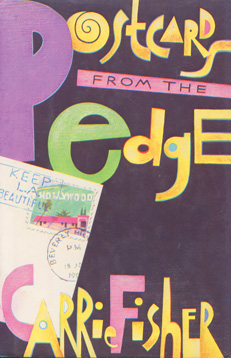All hail the princess
 CREDIT: GEORGE CORSILLO (COVER), SIMON AND SCHUSTER (PUBLISHER)
CREDIT: GEORGE CORSILLO (COVER), SIMON AND SCHUSTER (PUBLISHER)Written by Carrie Fisher, Postcards from the Edge tells the hilarious misadventures of a wayward actress coping with the tedium of the American Dream.
Thirty-eight years ago, an intrepid young filmmaker by the name of George Lucas cast a young, freshfaced and 105-pound 19-year-old woman named Carrie Fisher as the leading lady in an offbeat sci-fi film entitled Star Wars: A New Hope. Fast forward to December 2015 and, unless you’re a space worm living inside a meteor, you and everyone you know have since gone out to see the record-breaking release of the series’ seventh installation, Star Wars: The Force Awakens.
And even if you are a space worm, it should come as no surprise that in the interim Fisher has, despite her best efforts, failed to avoid the highly common process of aging. Even so, various critics throughout the Internet have called unnecessary attention to her unavoidably altered appearance in the new film, provoking a reaction from the actress who tweeted, “Youth&BeautyR/NOT ACCOMPLISHMENTS,theyre theTEMPORARY happy/BiProducts/ of Time&/or DNA.”
While Fisher’s acerbic wit speaks for itself, the fact that mass attention was all-too-easily redirected from her successful career to her body succumbing to its natural processes has been nothing short of disappointing. After all, it doesn’t take much investigating to discover that with Fisher, looks are but a small, happenstance part of the package. Not only is she a whipsmart Hollywood icon, she’s also a talented novelist to boot.
Postcards from the Edge (1987) is the first of five novels Carrie Fisher has written, in addition to her screenplays, memoirs and plays. Following its critical success, Fisher went on to adapt the book into a similarly successful film starring Meryl Streep and Shirley MacLaine in 1990.
Semiautobiographical in tone, the novel opens inside a rehab centre where actress Suzanne Vale is recovering from a drug overdose. As the novel shifts through the perspectives and narratives of Vale and her equally troubled associates, we begin to understand how all the superficial confusions of Hollywood can drive a person to gradually self-destruct with sex, junk food and illicit substances. Establishing an identity and learning to properly take care of oneself is tricky enough without the scrutiny of an entire nation; imagine how hard it becomes when every single bad decision becomes tabloid fodder and industry gossip.
A book written by the daughter of Hollywood royalty and beneficiary of cult status may threaten to read as a compendium of first-world complaints, yet Fisher’s heroine is in fact relatable in her thinly veiled quests for love, comfort and acceptance. The overall story covers her daily search for meaningful relationships, a fulfilling vocation and emotional security. Naturally a tale such as this can never be neatly tied up, but the novel cleverly gets the point across that this search is infinitely ongoing and remarkable in its own right.
Postcards from the Edge is a scintillating insight into themes of addiction and the hilarity of human flaws, both of which are just as prevalent now as they were in 1987. Having had intimate experience in both realms throughout her odd life, Fisher writes with a brash, humorous and articulate honesty that is sadly not so prevalent, inside or outside the hills of Hollywood. The book is the perfect proof that Carrie Fisher is, and always has been, more than a pretty set of buns.














